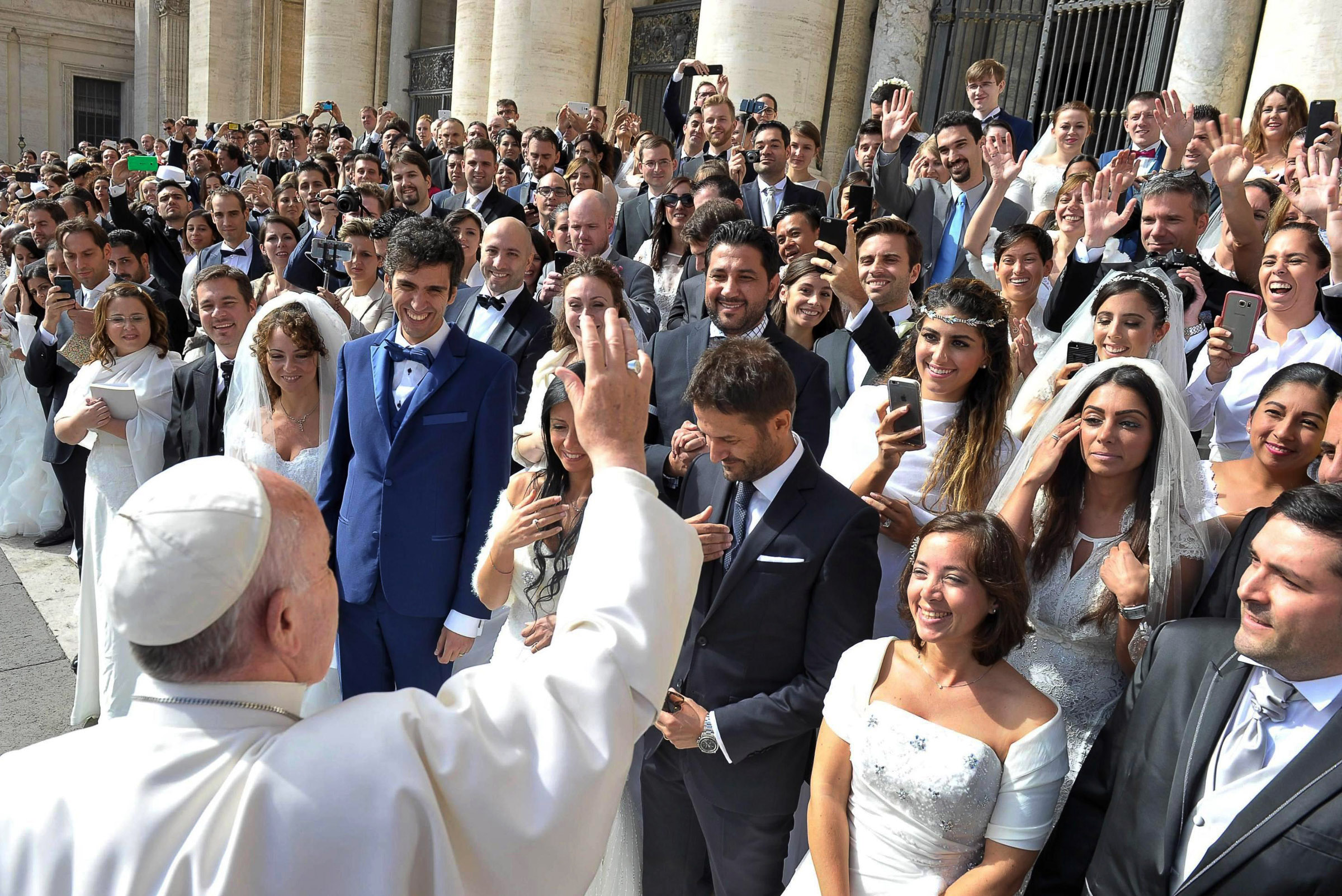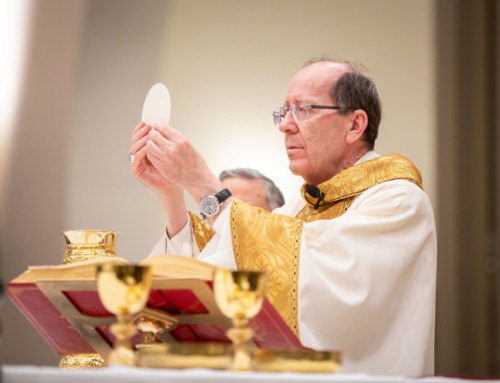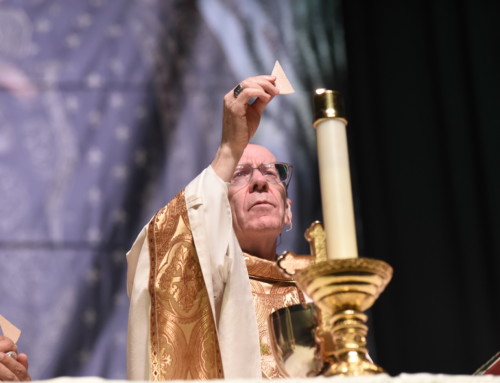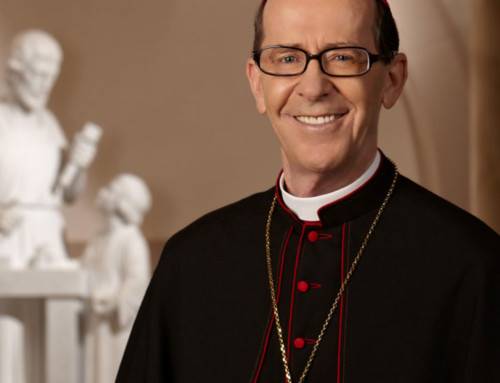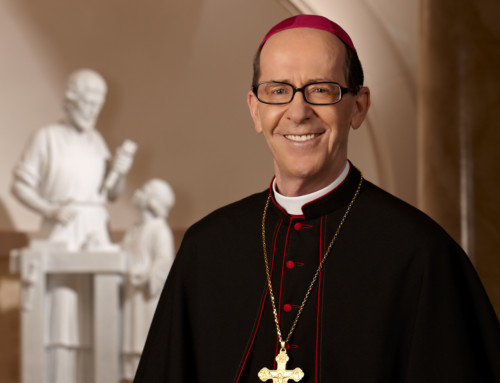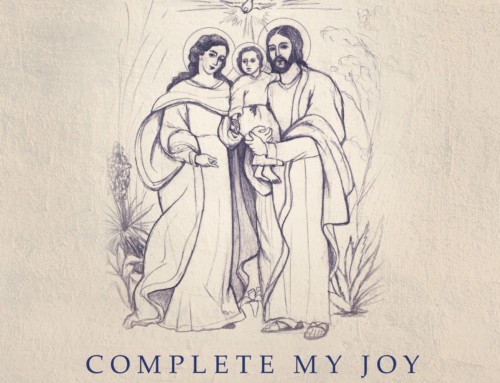This seven-part series from Bishop Thomas J. Olmsted originally appeared in The Catholic Sun, newspaper of the Roman Catholic Diocese of Phoenix, between April and November of 2016. Read: Amoris Laetitia, Pope Francis’ Post-Synodal Apostolic Exhortation On Love in the Family
Part One: Understanding Marriage Through St. Ignatius of Loyola
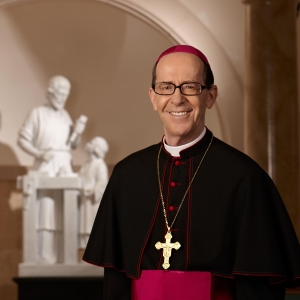
The Most Rev. Thomas J. Olmsted, Bishop of the Roman Catholic Diocese of Phoenix.
On the feast of St. Joseph, March 19, 2016, Pope Francis issued his Apostolic Exhortation on Love in the Family — Amoris Laetitia in Latin, in English “The Joy of Love.”
With a length of 325 paragraphs, it might seem too difficult to tackle. But in fact it is written in the same friendly and personally engaging manner that we have come to love about Pope Francis. It contains great compassion for people living in painful and difficult circumstances (cf. #291) and, at the same time, inspiring words about families who remain faithful to the teachings of the Gospel and “bear witness, in a credible way, to the beauty of marriage as indissoluble and perpetually faithful” (cf. #86).
In this Apostolic Exhortation, there is much to move the heart and fire the imagination. Some parts are exceptionally beautiful and will leave you with a hunger for more as well as a desire to return to them often. Let me give you a few examples:
Chapter 4 on “Love in marriage” begins with an engaging reflection on the Biblical passage on love found in 1 Corinthians 13:4-7: “Love is patient, love is kind; love is not jealous or boastful …”. Listen to just a little of what the Holy Father says about patience (#92): “We encounter problems whenever we think that relationships or people ought to be perfect, or when we put ourselves at the center and expect things to turn out our way. Then everything makes us impatient, everything makes us react aggressively. Unless we cultivate patience, we will always find excuses for responding angrily. We will end up incapable of living together, antisocial, unable to control our impulses, and our families will become battlegrounds. … Love always has an aspect of deep compassion that leads to accepting the other person as part of this world, even when he or she acts differently than I would like.”
In paragraph 133 of this same chapter on love, Pope Francis says that in the family, three words need to be used frequently — “please,” “thanks” and “sorry”: “In our families when we are not overbearing and ask: ‘May I?’; in our families when we are not selfish and can say: ‘Thank you’; and in our families when someone realizes that he or she did something wrong and is able to say ‘Sorry!’, our family experiences peace and joy. Let us not be stingy about using these words, but keep repeating them, day after day. For certain silences are oppressive, even at times within families, between husbands and wives, between parents and children, among siblings. The right words, spoken at the right time, daily protect and nurture love.”
In Chapter 2, Pope Francis writes about the lived experiences of families today, mentioning the many challenges faced by refugee and migrant families, the confusion caused by rampant individualism and the ideological denial of differences between men and women, the damage inflicted by pornography and child abuse, and the special needs of parents with children with disabilities. He closes this chapter by reminding us that there is (#57) “no stereotype of the ideal family, but rather a challenging mosaic made up of many different realities, with all their joys, hopes and problems.” And then the Holy Father states what he wants to do in this document: “The situations that concern us are challenges. We should not be trapped into wasting our energy in doleful laments, but rather seek new forms of missionary creativity. In every situation that presents itself, the Church is conscious of the need to offer a word of truth and hope.”
In order to offer “a word of truth and hope,” the next five chapters draw heavily upon the Sacred Scriptures and upon the Church’s teaching as found in the Magisterium, especially in that of Pope Paul VI (e.g. Humanae Vitae), Pope John Paul II (Familiaris Consortio and the Theology of the Body in particular), Pope Emeritus Benedict XVI (Deus Caritas Est) and the Catechism of the Catholic Church. In this way, Pope Francis invites us to understand his Apostolic Exhortation in continuity with the wisdom and pastoral practice that come down to us in the Church’s living tradition.
It is not surprising, then, that the Holy Father reaffirms controversial but vital truths about the indissolubility of marriage, the rights and dignity of children and the elderly, the false premise of same-sex unions, and so forth; yet he presents this teaching in a compassionate and persuasive manner.
Time and again, Pope Francis returns to the topic of children, speaking of them as “living stones” of the family (#14ff), “a gift of God” to be welcomed and never “robbed of their childhood and future” (#166). All of Chapter 7 is dedicated to the education of children. Parents will find here much timely advice; for example (#260): “Parents need to consider what they want their children to be exposed to, and this necessarily means being concerned about who is providing their entertainment, who is entering their rooms through television and electronic devises, and with whom they are spending their free time.”
Chapter 8 of Amoris Laetitia deals with questions of how to respond pastorally to the divorced and civilly remarried and to others who find themselves in complex and irregular situations. The Holy Father approaches these pastorally sensitive situations through the lens of mercy. He says (#291), “Let us not forget that the Church’s task is often like that of a field hospital.”
Then, Pope Francis calls for a pastoral approach of accompaniment and discernment, one that seeks to (#291) “accompany with attention and care the weakest of her children, who show signs of a wounded and troubled love, by restoring in them hope and confidence …”.
At the same time, while urging us to reach out and help each person to find his or her proper way of participating in the Church, he notes the need of (#299) “avoiding any occasion of scandal.”
The final chapter is devoted to the spirituality of marriage and the family. In this part, Pope Francis encourages family members (#323), “to contemplate our loved ones with the eyes of God and to see Christ in them.” Then, he closes with this helpful perspective (#325): “No family drops down from heaven perfectly formed; families need constantly to grow and mature in the ability to love. … All of us are called to keep striving towards something greater than ourselves and our families. … May we never lose heart because of our limitations, or ever stop seeking that fullness of love and communion which God holds out before us.”
Let us love one another with the love that comes to us from our heavenly Father and makes us a family in His Son.
Part Two: A Father’s WITH
The love of a father for his children and his wife is captured in a four-letter word: with. We see this in the life of St. Joseph, the foster father of Jesus. Even though he is mentioned a number of times in the Gospel accounts of Matthew and Luke, no words of his are recorded. What mattered was that Joseph was there, present to Mary and Jesus, always ready to listen and to encourage, to protect and to provide.
When the shepherds, after hearing the joyful news told them by the angel, hurried to Bethlehem, they “found Mary and Joseph, and the infant lying in the manger” (Lk 2:16). When King Herod “ordered the killing of all the boys in Bethlehem and its vicinity two years old and under,” (Mt 2:13), Joseph was there with Mary and the Child and, at the word of the angel, at once “rose and took the Child and His mother by night and departed for Egypt. He stayed there until the death of Herod” (Mt 14-15).
When Pope Francis writes about fatherhood in his Apostolic Exhortation on love in the family, he begins by mentioning the tragedy today of “a society without fathers,” where “the father figure is said to be symbolically absent, missing or vanished” (#176). He says, “Fathers are often so caught up in themselves and their work, and at times in their own self-fulfillment, that they neglect their families” (Ibid).
Isn’t it interesting that the first way that Jesus revealed the love of God the Father was by coming to be with us? Matthew tells us (Mt 1:22-23), “All this took place to fulfill what the Lord had said through the prophet: ‘Behold, the virgin shall be with child and bear a son, and they shall name him Emmanuel,’ which means ‘God is with us.’”
Matthew also tells us that the last words that Jesus spoke to His Apostles after His Resurrection and just before ascending into heaven were the following (Mt 28:19-20): “Go, therefore, and make disciples of all nations …. And behold, I am with you always, until the end of the age.”
When Pope Francis speaks about the pastoral care needed in the Church for persons in broken families, he underlines the need to be with them (#291), “… the Church must accompany with attention and care the weakest of her children, who show signs of a wounded and troubled love, by restoring them hope and confidence, like a beacon of a lighthouse in a port or a torch carried among the people to enlighten those who have lost their way or who are in the midst of a storm.”
It is instructive to compare this fatherly advice of Pope Francis on pastoral care of persons in “irregular marriages” with what he says about fatherhood (#177), “God sets the father in the family so that by the gifts of his masculinity he can be close to his wife and share everything, joy and sorrow, hope and hardship. And to be close to his children as they grow — when they play and when they work, when they are carefree and when they are distressed, when they are talkative and when they are silent, when they are daring and when they are afraid, when they stray and when they get back on the right path. To be a father who is always present.”
A father who is determined to be present naturally fulfills two key aspects of fatherhood’s mission and task: life-giving and protecting. In a homily given to priests, the Holy Father said, “All of us, to exist, to become complete, in order to be mature, we need to feel the joy of fatherhood: even those of us who are celibate. Fatherhood is giving life to others, giving life, giving life …” (Homily, June 26, 2013). As the pope’s repetition, “giving life”, suggests, this life-giving essence of fatherhood in a family only begins in the conjugal act and the conception of children. Children throughout their lives count on a fatherly life-giver, one who comes to them with concern, correction, advice, affection and encouragement when the way of life is confusing.
A father’s determined presence also provides the invaluable gift of protection in a world where the spiritual battle rages in both obvious and subtle ways. A father must be committed to the protection of his wife and children from all dangers, including one’s own weaknesses. Pope Francis, as he began his pontificate, spoke of St. Joseph as a strong protector and open-hearted father. He said, “… protecting demands goodness, it calls for a certain tenderness. In the Gospels, St. Joseph appears as a strong and courageous man, a working man, yet in his heart we see great tenderness, which is not the virtue of the weak but rather a sign of strength of spirit and a capacity for concern, for compassion, for genuine openness to others, for love. We must not be afraid of goodness, of tenderness!” (Inaugural Homily, March 19, 2013).
What a victory it would be for the family and the Church if we fathers set our faces like flint to develop the masculine virtues in such a way as to be life-givers and protectors in today’s fatherless society! Fathers, this is a work of art that the world needs. Even if hidden from the world like St. Joseph, your Father in Heaven who “sees in secret” will not forget your commitment to be with your wife and children.
We give thanks to our heavenly Father for watching over all of us as His beloved sons and daughters, and for sending us His only begotten Son to be with us always. With grateful hearts, we also lift up to Him our Dads and Granddads, living and deceased, giving thanks for them and commending them to His merciful care.
Part Three: Humanae Vitae Rediscovered
“We need to return to the message of the Encyclical Humanae Vitae of Blessed Pope Paul VI, which highlights the need to respect the dignity of the person in morally assessing methods of regulating birth.”
With these words in his Apostolic Exhortation Amoris Laetitia, Pope Francis reminded us that his own teaching on marriage and the family builds on the teaching of his papal predecessors; in this particular case when it comes to contraception and the gift of new human life, he draws our attention to the prophetic voice of Blessed Paul VI.
Why does Pope Francis say we need to return to the message of a document written so long ago? For one, he sees the need today to reiterate its key teaching on the “intrinsic bond between conjugal love and the generation of life” (#68). So, our present pope stated in paragraph #82 of Amoris Laetitia, “The Church’s teaching is meant to help couples to experience in a complete, harmonious and conscious way their communion as husband and wife, together with their responsibility for creating life.”
But, of equal if not greater importance, Pope Francis agrees with Paul VI’s prophesy of four dire consequences of rejecting the moral norms for birth regulation. Nearly half a century ago, in paragraph 17 of Humanae Vitae, he had predicted the following:
- Contraceptive practices would lead to marital infidelity and a general lowering of morality;
- Young people, who particularly need strong guidance on following morality, would be especially affected by the weakening of cultural sexual mores;
- Respect for women would decrease as they were seen increasingly as objects of pleasure rather than persons to be loved and to be treated as equals;
- Governments would coerce persons to act against their consciences and moral convictions, intervening aggressively into the intimacy and parenthood of married couples.
All four of these predictions, sadly, have proven true; indeed, the damage has dramatically increased in the past half century, just as Paul VI had foretold. For this reason, Pope Francis spoke of them forthrightly in Amoris Laetitia, even as he looked at what needs to be done today to address them effectively. For example, our present Holy Father writes in paragraph #54:
“…the shameful ill-treatment to which women are sometimes subjected, domestic violence and various forms of enslavement which, rather than a show of masculine power, are craven acts of cowardice. The verbal, physical and sexual violence that women endure in some marriages contradicts the very nature of the conjugal union. I think of the reprehensible genital mutilation of women practiced in some cultures, but also of their lack of equal access to dignified work and roles of decision-making … and the exploitation and commercialization of the female body in the current media culture.”
In paragraph #56, Pope Francis says, “Yet another challenge is posed by the various forms of an ideology of gender that denies the difference and reciprocity in nature of a man and a woman and envisages a society without sexual differences, thereby eliminating the anthropological basis of the family. This ideology leads to educational programs and legislative enactments that promote a personal identity and emotional intimacy radically separated from the biological difference between male and female.”
Later in this same paragraph, the Holy Father points out, “On the other hand, the technological revolution in the field of human procreation has introduced the ability to manipulate the reproductive act, making it independent of the sexual relationship between a man and a woman. In this way, human life and parenthood have become modular and separable realities subject mainly to the wishes of individuals or couples. … Let us not fall into the sin of trying to replace the Creator. We are creatures, and not omnipotent. Creation is prior to us and must be received as a gift.”
After acknowledging, then, the prophetic insight of Paul VI, Pope Francis indicates what needs to be done today to address this moral quagmire, saying (#57), “We should not be trapped into wasting our energy in doleful laments, but rather seek new forms of missionary creativity. In every situation that presents itself, the Church is conscious of the need to offer a word of truth and hope. The great values of marriage and the Christian family correspond to a yearning that is part and parcel of human existence. If we see any number of problems, these should be … a summons to revive our hope and to make it the source of prophetic visions, transformative actions and creative forms of charity.”
A great source of hope and inspiration in the Diocese of Phoenix today is the response of young people preparing for marriage, a process that, by the grace of God and the dedication of many apostolic clergy and lay faithful, has them encountering the fullness of the message of Humanae Vitae. With more than 100 instructors of Natural Family Planning in three languages, the positive vision of the fullness of the marital act becomes clear to so many of our young couples. As a result, more than 60 percent of our couples share that they plan to live Natural Family Planning in their marriages, and avoid contraception. Truth and love, man and woman, life and joy speak for themselves when they are given voice by so many apostolic clergy, couples and medical professionals. Certainly more is needed as we move into a 21st Century with so many challenges, but let us never doubt that God is with us!
May the Lord help us, as Pope Francis wishes, to discover anew the wisdom of this prophetic document. Let us be confident, creative, energized, and trust the truth regarding sexuality that the Holy Spirit has protected through the Church’s gift of prophetic teaching.
Part Four: Freedom’s need for guidance
“Deep within his conscience man discovers a law which he has not laid upon himself but which he must obey. Its voice, ever calling him to love and to do what is good and to avoid evil, sounds in his heart at the right moment …. His conscience is man’s most secret core and his sanctuary. There he is alone with God whose voice echoes in his depths” (Gaudium et spes, #16).
Pope Francis’ Apostolic Exhortation on the joy of love in the family gives particular attention to this basic teaching on conscience that comes to us from the Second Vatican Council. That is why he asks pastors of the Church to “accompany with attention and care” all who have suffered any breach in the marriage bond, with the aim of “… restoring in them hope and confidence” (#291). Pastoral discernment is needed, along with patience and perseverance, to discover how “to enter into dialogue” with “those who mistrust marriage, put off commitments, or break those already made” (#293). We must learn “to identify elements that can foster evangelization and human and spiritual growth” (Ibid).
The Holy Father dedicates one section of Amoris Laetitia to freedom and conscience (#33-37), two concepts which are frequently misunderstood today. Pope Francis says (#34) “… it is easy nowadays to confuse genuine freedom with the idea that each individual can act arbitrarily as if there were no truths, values and principles to provide guidance, and everything were possible and permissible.”
Freedom and license are not the same. To be free does not mean we can do whatever we feel like doing, that we can disregard the duties we have to one another, within the family and beyond. Freedom is the opportunity and the duty to be whom God created us to be and to fulfill His plan for our life.
No matter how great the confusion between freedom and license, therefore, we clergy and others who have the privilege of assisting the faithful who face difficult marriage problems, need to keep in mind that they (#37) “are capable of carrying out their own discernment in complex situations. We have been called to form consciences, not to replace them.”
The Church helps people to form their consciences according to reason in conformity with what is loving and true. As the Catechism teaches (#1783), “The education of conscience is indispensable for human beings who are subjected to negative
influences and tempted by sin to prefer their own judgment and to reject authoritative teachings.”
Our conscience is so closely linked to our personal dignity and integrity that we are obliged to follow it, even if it is erroneous. In other words, our integrity requires that we do what we think is right, even if in reality our thinking is wrong. This is why St. Thomas More could honestly tell his beloved daughter Meg that it was important that she follow her conscience even if it disagreed with his. He also knew, however, that when we act on an erroneous conscience, even if done in good faith and thus without being guilty of sin, damage and harm still result, i.e. that we and others will suffer the consequences. Objectively evil acts always cause harm, just as cyanide always is poisonous. This is why we have an obligation to form our consciences in accord with the truth. To refuse this obligation is to cut oneself off from true freedom. For, as Jesus teaches (Jn 8:31f), “If you remain in my word, you will truly be my disciples, and you will know the truth, and the truth will set you free.”
Aware that many today, including many within the Church, have an imperfect grasp of God’s plan for marriage, the Holy Father urges pastors and other qualified members of the Church to help “them understand the divine pedagogy of grace in their lives and offer them assistance so they can reach the fullness of God’s plan …” (#297). We are to assist our people to have a livelier faith in Christ and to trust the truth, especially when it is misunderstood or even contradicted in popular culture.
Part Five: Formation of conscience guarantees freedom
Married love “advances gradually with the progressive integration of the gifts of God” (#122), says Pope Francis in his Apostolic Exhortation on the Joy of Love in the Family. There is no limit to the spouses’ ability to participate in the infinite charity which is the Holy Spirit (cf. #134). “Even amid unresolved conflicts and confused emotional situations, they daily reaffirm their decision to love, to belong to one another, to share their lives and to continue loving and forgiving. Each progresses along the path of personal growth and development. On this journey, love rejoices at every step and in every new stage” (#163). On this journey to full maturity in Christ, the Church accompanies married couples and assists them in the lifelong task of formation of conscience which, as the Catechism says (#1784), “guarantees freedom and engenders peace of heart.”
Two gifts of God are necessary in this lifelong task of conscience formation: the light of God’s word and the authoritative teaching of the Church (Ibid, #1785). For good reason, then, Pope Francis affirms both of these as the primary foundation for his document. Literally and organically, he puts at the center of his Exhortation both these gifts of God: the Sacred Scriptures and the Magisterial teaching of the Church. In Chapter 4, he reflects on God’s teaching on love from the famous text of 1 Corinthians 13; and in Chapter 5, the Holy Father affirms the Church’s teaching on fruitfulness in marriage.
To assist married couples in the journey to mature love in Christ, the Church “seeks the grace of conversion for them” (#78), and encourages them to have confidence that forgiveness is always within their reach: “When we have been offended or let down, forgiveness is possible and desirable, but no one can say that it is easy. … We need to learn to pray over our past history, to accept ourselves, to learn how to live with our limitations, and even to forgive ourselves, in order to have this same attitude toward others” (#106f).
Throughout the entire Exhortation, and indeed throughout all of his papacy, the Holy Father has gone to great lengths to show that God’s Plan for marriage and family is truly good news, and that it is possible, with God’s grace, to know His plan, to accept it in faith and to live it with joy and ever deepening love.
As a good shepherd, Pope Francis focuses special attention on those who walk on the edge of despair because of personal failures and problems they have suffered in their families, and because of the complex and contradictory situations in which they find themselves now. He calls for deeper and sustained pastoral accompaniment of these suffering families, assuring them that they are welcome in the Church family, and that we are eager to seek ways to integrate them more fully into our local communities. This situation does not, it is important to note, mean that the Catholic persons are excommunicated from the Church. They should be encouraged to pray, attend Mass, and rectify the situation in communication with their pastor, who remains their pastor despite the case of objective sin. Accompaniment is possible and should be the case in our parishes.
This does not, however, include receiving Holy Communion for those who are divorced and remarried. Pope Francis specifically calls those in this situation “to seek the grace of conversion” (#78). Throughout Amoris Laetitia we see a continuity with the Church’s Magisterium especially that of Blessed Paul VI, St. John Paul II, and Pope Emeritus Benedict XVI which reaffirm the constant tradition of the Church.
In Familiaris Consortio #84, for example, St. John Paul II taught, “…I earnestly call upon pastors and the whole community of the faithful to help the divorced, and with solicitous care to make sure that they do not consider themselves as separated from the Church, for as baptized persons they can, and indeed must, share in Her life. They should be encouraged to listen to the Word of God, to attend the Sacrifice of the Mass, to persevere in prayer, to contribute to works of charity and to community efforts in favor of justice, to bring up their children in the Christian faith, to cultivate the spirit and practice of penance and thus implore, day by day, God’s grace. Let the Church pray for them, encourage them and show Herself a merciful Mother, and thus sustain them in faith and hope. However, the Church reaffirms Her practice, which is based upon Sacred Scripture, of not admitting to Eucharistic Communion divorced persons who have remarried. They are unable to be admitted thereto from the fact that their state and condition of life objectively contradict that union of love between Christ and the Church which is signified and affected by the Eucharist.” Similarly, Pope Emeritus Benedict XVI affirmed this consistent teaching and practice of the Church in Sacramentum Caritatis #29.
With wisdom, the Catechism teaches that (#1785), “we must … examine our conscience before the Lord’s Cross … assisted by the gifts of the Holy Spirit.” Without embracing the Cross of Christ, we cannot have life in Him. Only when we “take up our cross each day” and follow Him can we be His disciples. The Lord gives us the command and also the grace to do this, every day, beginning within the family in which by God’s grace we live.
Part Six: To Accompany and to Enlighten
Today I wish to consider the shepherding work of priests, who, in spiritual guidance and in confession, seek to help others to encounter the Amoris Laetitia, the “Joy of Love.” Earlier this year, Pope Francis, who has made Confession a constant theme of his pontificate, wrote in his recent book, “The Name of God is Mercy,” “It is important that I go to Confession, that I sit in front of a priest who embodies Jesus, that I kneel before Mother Church, called to dispense the mercy of Christ. There is objectivity in this gesture of genuflection before the priest; it becomes the vehicle through which grace reaches and heals me.”
As a confessor, this is both an honor and a great responsibility to accompany and enlighten the faithful in the Sacrament of Confession. In doing so, I am “fulfilling the ministry of the Good Shepherd who seeks the lost sheep, of the Good Samaritan who binds up wounds, of the Father who awaits the prodigal son and welcomes him on his return, and of the just and impartial judge whose judgment is both just and merciful” (CCC #1465). Here neither I nor any one of my brother priests are a “master of God’s forgiveness, but its servant” (CCC #1466). Neither are we masters of the commandments that God, in His love, has given us. Indeed, we are also servants of the commandments and can never change or eliminate them. For this reason, we are called to “have a proven knowledge of Christian behavior, experience of human affairs … [to] love the truth, be faithful to the Magisterium of the Church, and lead the penitent with patience toward healing and full maturity” (Ibid).
In Amoris Laetitia, Pope Francis speaks of the need to encourage young people to live authentic love. The confessional is certainly a place for this to happen, especially for those seeking to live the greatness of the calling to be husbands or wives. This is important even to those who are not yet married or who are recently married as the graces of the sacrament appeal to “their capacity for generosity, commitment, love and even heroism … inviting them to take up the challenge of marriage with enthusiasm and courage” (#40).
For those who are married in the Church, we pastors are called to encourage families to grow in faith. Here the Holy Father encourages “frequent Confession, spiritual direction and occasional retreats. … also … family prayer during the week, since ‘the family that prays together stays together’” (#227). He notes especially “the power of grace experienced in sacramental Reconciliation and in the Eucharist, grace that helps them face the challenges of marriage and the family” (#38).
As well, it is in the confessional that the sensitive work of accompaniment is offered to those in difficult situations, whether that be divorce or those in a union subsequent to marriage. In considering the priest’s role in Confession or in regular pastoral guidance of the faithful, he states that “priests have the duty to ‘accompany in helping them to understand their situation according to the teaching of the Church’” (#300). This, he states, is done in such a way that promotes reflection and repentance which includes discernment that “guides the faithful to an awareness of their situation before God” (Ibid).
Amoris Laetitia, as the Holy Father states, does not seek to provide “a new set of general rules, canonical in nature and applicable to all cases” (#300), but does include the encouragement to do all that is possible to seek to reconcile all the faithful to the fullness of the sacramental life. Here the Holy Father mentions “the internal forum” as the place of spiritual accompaniment and enlightenment for those seeking to be conformed to God’s love for them. The internal forum is the place of private and confidential consideration with one’s pastor of how to attain full integration into the sacramental life of the Church. This has, at times, been incorrectly used as a place where a private decision about the validity of a marriage could be made. This, as the Church has made clear on a number of occasions, is not the case. A priest is not at liberty to dispense a member of the Church of their vows, especially in such a private way that does not take into consideration the will and understanding of all parties involved. As Jesus our Lord said very clearly “… what God has joined together, no human being must separate.” (Mt 19:6). These weighty and important decisions are, instead, afforded a due process within the Church in light of Canon Law.
The “internal forum” is also never a place where a priest can dispense of the Lord’s words about marriage: “Whoever divorces his wife and marries another commits adultery against her; and if she divorces her husband and marries another, she commits adultery” (Mk 10:11f). Here the guidance of the priest is directed toward “the formation of a correct judgment on what hinders the possibility of a fuller participation in the life of the Church and on what steps can foster it and make it grow. …, this discernment can never prescind from the Gospel demands of truth and charity, as proposed by the Church…” (#300).
To my brother priests, I share the sentiments of Pope Francis who wrote, in his message to the world on the occasion of a Year of Mercy “I will never tire of insisting that confessors be authentic signs of the Father’s mercy” (Misericordiae Vultus 17). And to the faithful, I will never tire of inviting you to the power of God’s mercy and, with the guidance of your shepherds, to experience the “Joy of Love.”
Part Seven: The Indissolubility of Marriage
The Joy of Loving Like God Loves
My mother and father’s 73-year marriage came full circle when Mom and the rest of our family lovingly ushered my father to the goal of their union from the beginning: the merciful encounter with our heavenly Father when this earthly life is done. The little church where we celebrated the funeral Mass was filled to overflowing with those touched by the truth, goodness and beauty of my parents’ deeply loving and fruitful, even if not perfect, union. I did nothing to deserve such a foundation of human love in life; my parents’ marriage was simply a gift. It is a gift that demands a response of gratitude and an effort to live in such a way as to point to the reality present and revealed in such love.
This reality of faithful married love is truly beautiful. As Pope Francis says in Amoris Laetitia (The Joy of Love) (86), “With inner joy and deep comfort, the Church looks to the families who remain faithful to the teachings of the Gospel … for they bear witness, in a credible way, to the beauty of marriage as indissoluble and perpetually faithful.”
There is indeed something profoundly beautiful about indissolubility. As the Holy Father says, it makes marriage capable of being (#11) “a true and living icon … capable of revealing God the Creator and Savior.” It gives children a stable home in which they can naturally trust in God’s faithful love of them. The Catechism puts it this way (#1640): “Thus the marriage bond has been established by God himself in such a way that a marriage concluded and consummated between baptized persons can never be dissolved. This bond, which results from the free human act of the spouses and their consummation of the marriage, is a reality, henceforth irrevocable, and gives rise to a covenant guaranteed by God’s fidelity. The Church does not have the power to contravene this disposition of divine wisdom.”
When in the Nicene Creed we profess our faith in the “Father Almighty, Maker … of all things visible and invisible,” one of the most powerful invisible realities we should have in mind is the invisible but real and indissoluble bond put in place by God at the consent of man and woman in the covenant of sacramental marriage.
Down through history, the challenge of this teaching has been found by some as too much to bear or too much to expect of mere mortals. Still today, some seek to explain it away using various arguments, even seeking to use, wrongly, the teaching of Pope Francis to justify relativizing the permanence of the sacramental marriage bond.
For example, one of these clever but unsound arguments goes something like this: “A consummated, sacramental marriage is indissoluble in the sense that spouses ought always to foster marital love and ought never choose to dissolve their marriage and remarry; however, by causes beyond the spouses’ control and/or by the grave faults of one of them, their human relationship as a married couple sometimes deteriorates until it ceases to exist. When a couple’s marriage relationship no longer exists, their marriage has dissolved, and one or both parties may rightly seek a civil divorce and remarry.”
Such an argument, in all of its worldly exhaustion, has one glaring problem: Jesus Himself, the incarnate Son of God who showed us the surprising depth and reality of Love, disagrees clearly and wholeheartedly. He says (Mk 10:9ff), “What God has joined together, no human being must separate. … Whoever divorces his wife and marries another commits adultery against her; and if she divorces her husband and marries another, she commits adultery.”
In this famous passage found in all three of the Synoptic Gospels, even the Lord’s disciples balked (Mt 19:10): “If that is the case of a man and his wife, it is better not to marry!” How could the call of marriage, they thought, be so clear and absolute? But the faithful of the Church, by becoming one with Christ in Baptism and putting on the mind of Christ through the Holy Spirit, come to trust the truth and discover that with God all things are possible. It is at one and the same time challenging and exhilarating, calling for obedience and gratitude and moving the Church’s ministers to accompany, with mercy, those who have violated it or find it difficult to bear.
The renewal of our hearts through mercy must continue and grow in the Church. Heaven forbid that we be among those Christ rebuked most strongly, the Pharisees, who were unmoved to help their people with their burdens (Cf. Mt 23:4).
I remain deeply grateful to those priests, religious and lay leaders who have devoted serious time to accompany the engaged, the civilly divorced, those seeking an investigation of nullity as well as those struggling in marriage to be faithful to the clear words of our Lord. I am especially appreciative of their evangelical courage in upholding the livable ideal and in cultivating the affective maturity which keeps us from backing away from the wounded and the confused who come to the Church for strength on the journey to Heaven.
We have great reason for hope that the challenges of marriage in our time will give rise to heroic witnesses to Christ as He pours out graces more than equal to the task. St. Paul reminds us that history is replete with examples: “where sin abounded, grace abounded all the more …” (Rom 5:20). The marriage “icons” of our time have the task, and the capability with God’s abundant grace, to radiate the beauty and goodness and truth of God’s glory.
© 2016-2018 The Roman Catholic Diocese of Phoenix. All rights reserved. Used with permission.

